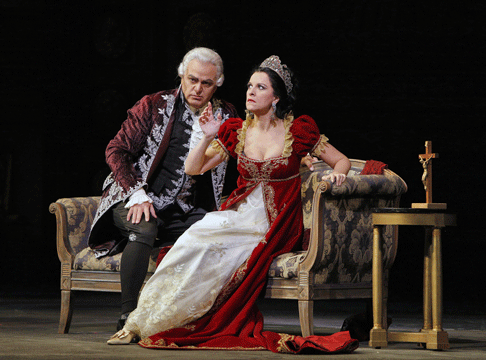16 Nov 2012
Tosca in San Francisco
Operatic train wreck in San Francisco, hopes crushed for 3000 opera-goers, impresario’s grand scheme derailed.

Operatic train wreck in San Francisco, hopes crushed for 3000 opera-goers, impresario’s grand scheme derailed.
Now that I’ve got your attention.
There were even advance whispers that something dramatic might happen. Well, no surprise given the cast of characters, character that is — Romanian soprano Angela Gheorghiu.
Huge anticipation was in the air for the American premiere of Mme. Gheorghiu’s Tosca, a role Opera Today’s London critic said she was born to play, the quote trumpeted all over San Francisco. Most of the world knows more about Mme. Gheorghiu marital dramas than it knows about her artistry. But luckily here in San Francisco we do know her charming Rondine and her touching Mimi as well. Adding all this up we were indeed prepped for a dynamite Tosca (after all maestro Luisotti was in the pit).
Angela Gheorghiu was born to play Tosca. The Floria Tosca that entered Sant’Andrea della valle exuded layers of histrionic complexity, her voice was soft, her presence lost, a fiery diva in a sanctuary where women are pure. Her duet with Cavaradossi was fraught with interior conflict that exploded from time to time in full voice, detailing movements of emotion that would prepare her spiritually for what we already knew she must do — in full voice — as the evening unfolded.
Nicola Luisotti drove his orchestra full throttle, the voice of operatic verismo, searching for a depth of histrionic orchestral tone, ignoring the forward dramatic thrust of the words themselves. Often an open conflict between the pit and the stage instigated by this maestro results in inspired music making, a duet of conductor and singer that is exponentially richer than voice alone. But famously la Gheorghiu avoids rehearsing, and perhaps this precipitated the musical error (an early entrance) that passed unnoticed by most (or was accepted as diva histrionics), but certainly unsettled this temperamental diva in performance.
Meanwhile stage director Jose Maria Condemi well exposed the machinations of Scarpia that would fulfill his lust for the actress Tosca. Italian baritone Roberto Frontali relished the role, making the predatory Baron less powerful and more insidious than we have usually seen in San Francisco and elsewhere, aided in no small part by the maestro who gave him huge volume and color to work with. Mr. Frontali has a sizable, not beautiful voice and the musical confidence to contend with the Luisotti pit.
 Roberto Frontali as Scarpia and Angela Gheorghiu as Tosca
Roberto Frontali as Scarpia and Angela Gheorghiu as Tosca
Well, this leaves Cavaradossi, Massimo Giordano. Mr. Giordano is a flawed singer who has loud high notes that he only seems to effect if he attacks them from above. This places an accent where usually there would be a smooth line. While this mannerism could be used for dramatic effect it became obvious that this was central to his vocal technique. While it was jarring in the first act at least we hoped it might be just an amusing tenorial affectation, if used without taste or discretion.
Mo. Luisotti, Mr. Frontali, the San Francisco Opera Orchestra and Chorus erupted in a Te Deum that completely enveloped the War Memorial Opera House. The curtain fell, the audience roared, and the evening ended.
Not that the performance did not in fact continue. Mme. Gheorghiu pulled out, physically distressed (intestinal flu we were told), though the suspicion lingers that it was vocal distress, and certainly a large dose of emotional distress must be included. We waited while the cover singer, Melody Moore, was costumed. Mlle. Moore is a promising young singer who does not have the spinto capabilities demanded by the role. She was painfully ill-suited to follow the diva footsteps made by Mme. Gheorghiu in the first act, nor did she seem coached or rehearsed to do so. It is indeed strange that San Francisco Opera had not anticipated such an occurrence, hardly unexpected from la Gheorghiu.
Thus impresario’s David Gockley coup de theatre (not just one, but two Tosca divas) gone up in smoke.
Michael Milenski
Cast and Production
Floria Tosca Act I: Angela Gheorghiu; Floria Tosca Acts II and III: Melody Moore; Mario Cavaradossi: Massimo Giordano; Baron Scarpia: Roberto Frontali; Angelotti: Christian Van Horn; Spoletta: Joel Sorensen; Sacristan: Dale Travis; Sciarrone: Ao Li; Jailer: Ryan Kuster; Shepherd Boy: Etienne Julius Valdez. San Francisco Opera Orchestra and Chorus. Conductor: Nicola Luisotti; Stage Director: Jose Maria Condemi; Production Designer: Thierry Bosquet; Lighting Designer: Christopher Maravich. San Francisco War Memorial Opera House. November 15, 2012.